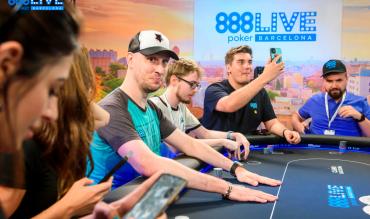Knowing when and how to make a bluff work is an important part of poker. And, it also helps you understand when YOU’RE being bluffed as well. Here are 5 tips to help you get your bluffs through:
Tip 1 - Have a plan
The important thing with bluffing is to have a plan and know what you’re targeting.
If you bet T9dd on an A62dch flop, you need to know what you’re doing on a variety of turn cards.
For example, if the turn is a 7, are we going to apply that pressure again targeting them to fold K high or a small pair? Or are we going to check back and see a free river card? These decisions depend on a number of factors, like how close you are to the money and how aggressive your opponent is.
What’s important is to think about this ahead of time so you're prepared for when that turn card lands.
This also leaves you free to concentrate on live tells if you're playing live, or on other tables if you're playing online poker.
Tip 2 - Know which cards help you
Make bluffs only on cards that are good for your range and bad for your opponents.
That makes your bluff more believable AND makes it less likely for them to have enough to call.
Let’s say the button opens, the big blind calls and the flop is 762. It goes check, bet, call and the turn is the 4.
This is a much better card for the big blind than the initial raiser, because it’s very unlikely for the initial raiser to have 85 or 35, but not unlikely for the big blind.
The big blind therefore may choose to lead into the pre-flop raiser both with made hands and bluffs.
Tip 3 - Know which cards hurt your bluff
While it’s important to bluff on cards that could have hit your range, you need to also know what cards would normally improve your opponent’s hand. Don’t bluff when they might have more reason to call.
Look at this example where the turn is a K. This card is typically a lot better for the initial raiser, in this case the button. It’s less likely to hit us in the big blind.
We shouldn’t lead bluff it.
If the button hasn’t hit that King, they should definitely still bluff because as the pre-flop raiser, it’ll look believable.
Tip 4 - Blocking the nuts
A nut blocker is a card in your hand, that makes it a lot less likely that your opponent has the nuts.
Bluffing into the nuts is no fun and having a blocker makes that less likely.
If the board reads Ad5c4dJdTs and we have the Kd in our hand, this is a good time to try for a bluff.
We can do this because we block our opponent from having very strong hands. Because we have the Kd, our opponent cannot have the nut flush. They also have less of a chance of having KQ because again, we have one of the kings blocking that combination.
It’s harder for them to call when we block the nuts.
Tip 5 - Tell a believable story
A bluff is best when it makes logical sense. Don’t change your mind halfway through a hand and try to represent something you can't have.
If you wouldn’t play the nuts in the way you’ve played your bluff, your opponents will sniff you out.
Also, if you never bluff in situations where you miss the flop, your opponents will rarely pay you off!
Make sure you know which good hand you’re representing and that you’re playing your bluff just the same!
Summary
In the intricate game of poker, mastering the art of bluffing is an essential skill that requires strategic planning, card selection, and a well-crafted narrative. These five tips provide a roadmap to successful bluffs: devise a clear plan, choose cards that complement your range, avoid cards that favor opponents, employ nut blockers wisely, and maintain consistency in your story. By understanding the psychology behind bluffs and their execution, you can elevate your poker prowess and make informed decisions that keep your opponents guessing. Remember, subscribing for more strategic insights will further enhance your gameplay.


